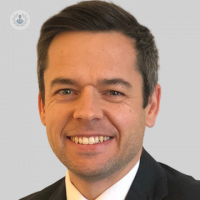Explained: NeuroSAFE for robotic radical prostatectomy (RRP)
Written by:NeuroSAFE is an increasingly popular procedure used to minimise sexual dysfunction after prostate cancer surgery. Leading consultant urological and robotic surgeon Mr Benjamin Lamb explains more about the procedure, including how it works and its benefits.

Can robotic radical prostatectomy (RRP) affect the nerves?
Robotic radical prostatectomy (RRP) has been fundamental in changing the course of prostate cancer treatment, and offers improved outcomes and reduced side effects compared to traditional open surgery. However, RRP can potentially lead to nerve damage, causing erectile dysfunction and urinary incontinence.
A new technique called NeuroSAFE has recently emerged, with the aim of preserving the neurovascular bundles responsible for erectile function while performing a prostatectomy.
What are neurovascular bundles?
The neurovascular bundles are delicate structures located on either side of the prostate gland, containing the nerves responsible for erectile function.
The preservation of these bundles is vital for maintaining sexual potency after a prostatectomy. Nonetheless, their intricate nature and close proximity to the tumour present a risk of inadvertent damage during surgery.
What is NeuroSAFE?
NeuroSAFE (Neurovascular structure adjacent to the prostate) is an intraoperative technique that aids surgeons with identifying and preserving the neurovascular bundles during RRP. A team of urologists, pathologists, and radiologists work to carry out the NeuroSAFE procedure.
The process involves meticulously dissecting the prostate, with continuous guidance from real-time feedback provided by frozen section analysis of the tissue margins.
How does NeuroSAFE work?
Preoperative planning: preoperative imaging, such as magnetic resonance imaging (MRI) works to identify the precise tumour location, as well as neurovascular bundles, which in turn, guides surgical planning.
Intraoperative frozen section analysis: After the prostate gland is removed during surgery, frozen sections of the surgical margins will be sent for immediate analysis. Pathologists will then examine the tissue in order to identify cancer cells near the neurovascular bundles.
Immediate decision-making: if the frozen section analysis identifies cancer near the vascular bundles, the surgeon can then modify the extent of prostate resection. By providing immediate input, this feedback allows for the preservation of nerves while ensuring the thorough removal of the tumour.
What are the benefits of NeuroSAFE in RRP?
Improved nerve preservation: NeuroSAFE provides timely insights into the proximity of the tumour to the neurovascular bundles, enabling surgeons to adapt their approach. This precision enhances nerve preservation, believed to contribute to improved outcomes in postoperative sexual function.
Individualised treatment: NeuroSAFE provides a personalised approach to RRP, tailoring the technique based on the characteristics of each tumour, which permits optimal cancer control, while still minimising the risk of nerve damage.
Enhanced surgical confidence: the presence of real-time analysis during surgery is said to increase surgical confidence, thereby decreasing intraoperative stress and improving outcomes.
Minimised side effects: preserving the neurovascular bundles is hypothesised to lower the likelihood of erectile dysfunction and potentially enhance the recovery of urinary incontinence (frequent side effects of prostatectomy), thereby contributing to an improved quality of life for patients after surgery.
If you would like to book a consultation with Mr Lamb, simply visit his Top Doctors profile today.


